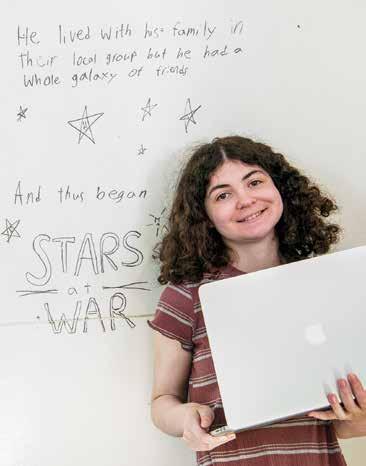
2 minute read
Flexing Both Sides of the Brain
Four Cal Lutheran students explain the benefits of blending the arts and sciences
How does the combination of science and art express who you are?
Advertisement
Elizabeth: Computer science allows me to approach a problem analytically, and multimedia helps me find creative solutions.

Elizabeth Gonzales '22, is a Computer Science major and Multimedia minor who makes short, semi-animated videos
Devin: I’m curious about the world and its many phenomena, but I also enjoy the humanity of music and its sublime wonder.

Devin Romines '21 is a Biology and Music major with minors in Mathematics and Chemistry who plays piano in Cal Lutheran's Chamber Music group, the Wind Ensemble, and the Improve Troupe
Julia: Challenging my mind with chemistry, while also embracing my artistic side through music, fulfills my desire to always work both sides of my brain.

Julia Garcia '20 is a Music major with a minor in Chemistry who performs in the Cal Lutheran Choir, Women's Chorale, had her opera debut in 'Hansel & Gretel' and sings with the Jazz Ensemble and Mariachi Ensemble
Xavier: I love being creative and performing in theatre productions, and I’m also very curious to understand how the world around me operates.

Xavier F. Reynoso '22, is a Biology and Theatre Arts major who was an actor in 'Fuenteovejuna', in the tech crew for 'The Wolves', and wrote two 10-minute musicals
How does your art form complement your work in science?
Elizabeth: I love coding, but there are times when I get stuck and find myself just staring at a screen. When this happens, I find it helpful to take a break and do something else, like doodling a picture or writing up another section of a story. When I switch gears back to computer work, I usually see what I’ve done wrong and I’m able to fix it.
Devin: Switching back and forth between music and science can actually be pretty refreshing. After long shifts in the lab scoring through fruit flies or studying for a stressful exam, it can be a relief to go to the music world and work on things there. Then I come back to science rejuvenated.
Julia: Music takes a lot of energy, focus, critique and concentration to fix mistakes, improve your sound and perfect your technique. Since I am so used to multitasking while performing a piece, I find this skill comes in handy in science, because there is usually more than one element to a reaction or mechanism.
Xavier: Theatre has allowed me to become a very confident public speaker and be able to share my ideas with others. This is greatly beneficial in science because it has enabled me to effectively share my findings from experiments and research with others.
How does your work in science complement your art form?
Elizabeth: Instead of making my current multimedia project a linear adventure, I decided to program it into a pick-your-path game. This helped me develop my characters as I had to write about how they react to a variety of situations.
Devin: The math classes I’ve taken have provided me with a better understanding of musical theory, and an in-depth comprehension of the patterns that make up music.
Julia: Science takes focus, dexterity and attention to detail in order to solve problems and understand function. This complements my study of music because it similarly requires a great level of precise effort to learn a complex piece.
Xavier: In science I take ideas and apply them to many different situations and scenarios. Similarly, I can apply techniques and acting styles I learn from one class or production to another.

